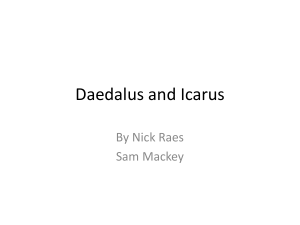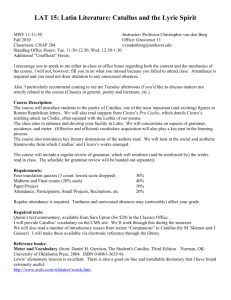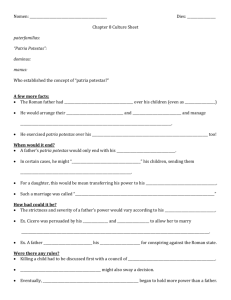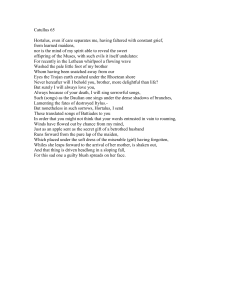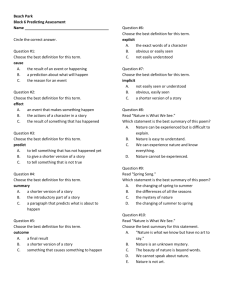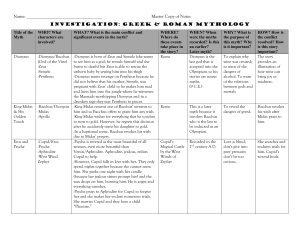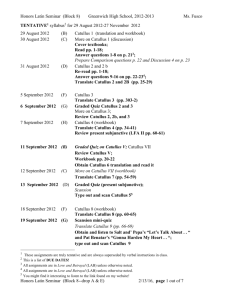Catullus & Ovid: Latin Interpretation - Curriculum Support
advertisement
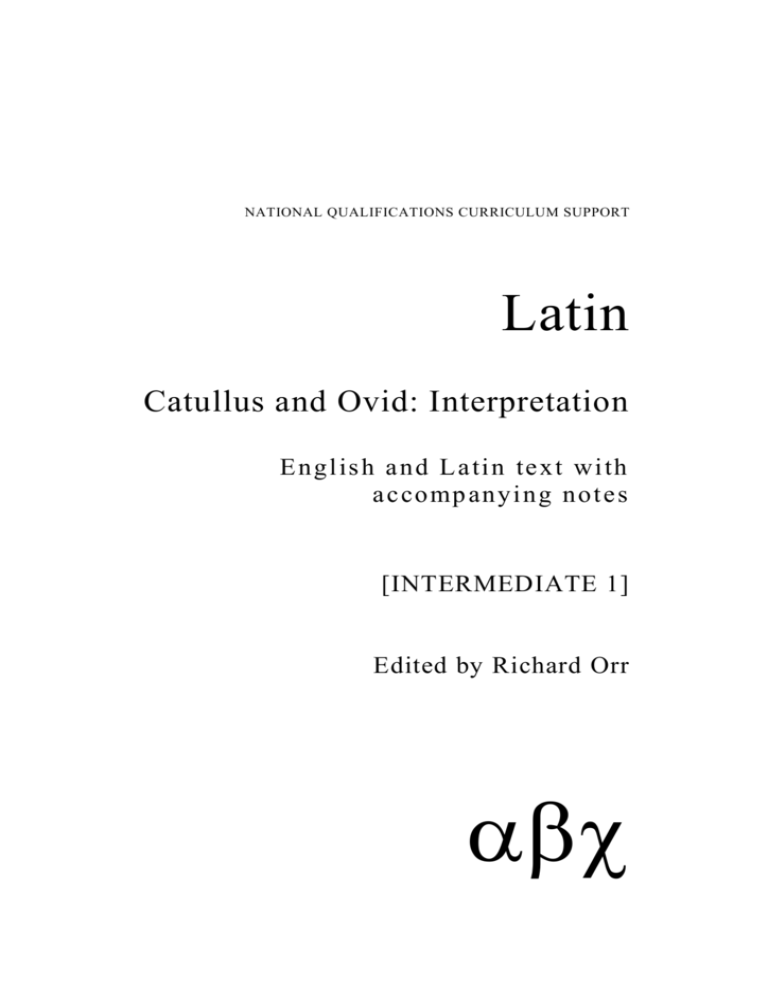
NATIONAL QUALIFICATIONS CURRICULUM SUPPORT Latin Catullus and Ovid: Interpretation Eng lish and La tin tex t w ith a c co mp an ying no te s [INTERMEDIATE 1] Edited by Richard Orr First published 1998 Electronic version 2001 © Scottish Consultative Council on the Curriculum 1998 This publication may be reproduced in whole or in part for educational purposes by educational establishments in Scotland provided that no profit accrues at any stage. ISBN 1 85955 146 7 Learning and Teaching Scotland Gardyne Road Dundee DD5 1NY www.LTScotland.com HIST O RY 3 CONTENTS Catullus CONTENTS Foreword Introduction Passage 4 (Poem LI lines 1-12) in Latin with notes Passage 5 (Poem V) in Latin with notes Passage 6 (Poem III) in English with notes Passage 7 (Poem LXX) in Latin with notes Passage 8 (Poem LXXXV) in Latin with notes Passage 9 (Poem VIII) in Latin with notes Passage 10 (Poem LXXVI lines 13-26) in English with notes Questions Talking points v 1 4 6 8 10 12 14 16 19 25 Ovid Introduction Passage 11 lines lines lines lines lines End of the story Questions Talking points 27 1-10 10-17 18-31 32-41 42-50 30 32 34 36 38 40 41 45 LAT I N iii iv LAT I N FOREWORD The content of this booklet largely reproduces material prepared by a writing group for Strathclyde Regional Council and intended to support interpretation of prescribed text. Short sections of the prescribed text are accompanied by facing notes designed to facilitate translation and interpretation. Vocabulary assistance is also offered as appropriate. Questions of an interpretive nature are also included at the end of each selection from the author. These questions are designed to exercise the required skills and can be used after each poem in the case of Catullus or after longer sections of text in Ovid’s case. Talking points are offered to supply a wider context and to stimulate discussion. LAT I N v vi LAT I N INTRODUCTION Catullus Gaius Valerius Catullus was born about 84 BC in the city of Verona in northern Italy. His father was well-to-do and a friend of Julius Caesar. Catullus probably came to Rome as a young man in his early twenties to complete his education and begin a career. It was about this time he fell under the spell of the beautiful married lady whom he addresses in his poems as ‘Lesbia’. The affair with Lesbia was brief and very unhappy. Her repeated infidelities drove the poet to extremes of love and hate and in the end to despair and loathing. At some point Catullus suffered another emotional blow, the death of a brother to whom he was very close. The brother was buried in Asia Minor near Troy. It was possibly with the intention of paying his last respects to his brother’s grave that Catullus joined the staff of the Governor of Bithynia, Gaius Memmius. His year in Bithynia (57-56 BC) was not especially enjoyable or profitable. He was glad to return to Italy and his father’s villa on the beautiful Lake Garda, just north of Verona. Catullus spent most of his life in Rome where he mixed with a very ‘smart set’ of sophisticated, well-educated young writers. He was also on friendly terms with members of Roman high society. Catullus died in his thirtieth year around 54 BC. The poetry of Catullus All that survives of Catullus’s work is a collection of one hundred and sixteen poems of varying lengths. Catullus, like many others in his social position, had a good knowledge of Greek and Greek literature. In particular he was impressed by the Greek poets from Alexandria in Egypt which had become the greatest centre for Greek education and lit erature. He borrowed many ideas from these sophisticated and scholarly poets who lived and worked in about 250 BC. Like the Alexandrian poets Catullus could be sophisticated and scholarly when necessary. But in his poetry he also uses colloquial speech, the language of the ordinary people of Rome, to communicate and express his emotions. Catullus is very much a personal poet. His feelings and his emotions are the subject of much of his poetry. LAT I N 1 IN T RO D UC T IO N Lesbia Twenty six poems, mostly short, were written as a result of the poet’s affair with Lesbia. But Lesbia was a poetic name only, a pseudonym concealing the identity of a married woman. In using the name, Catullus was paying a compliment also to Sappho, the Greek lyric poetess who lived and wrote on the island of Lesbos in the Seventh Century BC. Who then was Lesbia? There is evidence* that her real name was Clodia. She may have been one of the three sisters of P. Clodius Pulcher, a politician whose actions scandalised Roman society. Two of the sisters t hemselves had scandalous reputations. It has been customary to identify Clodia as the eldest sister, the wife of Quintus Caecilius Metellus Celer who was consul in 60 BC and died in the following year. Her character was cruelly exposed by the orator Cicero in his speech Pro Caelio delivered in 56 BC. In the twenty six poems each phase of the passionate affair is recorded for all time. There is the exhilaration of newly-discovered love, the hopes of a deep and lasting relationship and the gathering cloud s of doubt, misgivings, suspicion. Love alternates with hatred and at times renunciation, loathing and disgust. *The writer Apuleius (Apologia 10) 2 LAT I N LAT I N 3 CA TU L L U S PASSAGE FOUR Poem LI Catullus is envious of the man who sits opposite Lesbia. ille mi par esse deo videtur, ille, si fas est, superare divos, qui sedens adversus identidem te spectat et audit 5 dulce ridentem, misero quod omnes eripit sensus mihi: nam simul te, Lesbia, aspexi, nihil est super mi vocis in ore. 10 lingua sed torpet, tenuis sub artus flamma demanat, sonitu suopte tintinant aures, gemina teguntur lumina nocte. par, paris sum, esse, fui deus, -i (m) fas (n) supero (1) divus, -i (m) qui, quae, quod sedeo (2) adversus specto (1) audio (4) dulcis, -is, -e rideo (2) miser, -era, -erum omnis, -is, -e demano (1) 4 LAT I N equal be god right be better than god who, which sit opposite look at listen to sweet laugh miserable, unhappy all flow down eripio (3) + accus. and dat. snatch away from sensus, -us (m) feeling, sense aspicio (3) aspexi look at nihil nothing super left over vox, vocis (f) voice lingua, -ae (f) tongue torpeo (2) be numb, paralysed tenuis, -is, -e fine, subtle sub (+ accus.) under, below artus, -us (m) limb flamma, -ae (f) flame auris, -is (f) ear CA TU L L U S line 1 ille mi videtur ‘that man’. Catullus does not tell us who that man is. = mihi ‘seems’ line 2 si fas est ‘if that is allowed’. Having dared to suggest that a mortal could be the equal of a god in line 1, Catullus is about to make an even more daring suggestion – that a human could surpass the gods. To avert the anger of the gods Catullus includes this excuse. line 3 identidem ‘repeatedly’. Take with spectat (line 4). line 5 dulce ridentem This describes te (line 3) – ‘your sweet laughter’ lit. ‘you laughing sweetly’. Take with mihi (line 6). See note on line 6. ‘this’ lit. ‘which’ – refers to all the experiences of lines 1-5. Take with sensus (line 6). misero quod omnes line 6 mihi (misero) simul lines 7-8 nihil est super mi vocis in ore lines 9-10 tenuis sub artus flamma demanat ‘from me in my unhappiness’ lit. ‘from unhappy me’ ‘as soon as’ ‘I am left speechless’ lit. ‘there is (est) no voice (nihil vocis) left over (super) to me (mi) in my mouth (in ore)’. ‘an invisible fire spreads through my system’. The fire of love! line 10 sonitu suopte ‘with their own sound’. The poet has ringing noises in his ears. line 11 tintinant ‘ring’. Catullus chooses a word which sounds like its meaning. This is an example of onomatopoeia. Compare the English word ‘buzz’. lines 11-12 gemina teguntur lumina nocte ‘my two eyes are covered by darkness’. lit. ‘my eyes (lumina) are covered (teguntur) by twin night (gemina nocte)’. LAT I N 5 CA TU L L U S PASSAGE FIVE Poem V Catullus is in love with Lesbia. It is the start of t he affair. He wants Lesbia to love him in return. Life, he says, is for living and loving. vivamus, mea Lesbia, atque amemus, rumoresque senum severiorum omnes unius aestimemus assis! soles occidere et redire possunt: nobis cum semel occidit brevis lux, nox est perpetua una dormienda 5 The exact number of their kisses must never be known or bad luck could be the consequence. 10 da mi basia mille, deinde centum, dein mille altera, dein secunda centum, deinde usque altera mille, deinde centum. dein, cum milia multa fecerimus, conturbabimus illa, ne sciamus, aut ne quis malus invidere possit, cum tantum sciat esse basiorum. vivo (3) rumor, -oris (m) senex, -is (m) severus, -a, -um unus, -a, -um sol, solis (m) occido (3) redeo, redire possum, posse lux, lucis (f) nox, noctis (f) perpetuus, -a, -um dormio (4) 6 LAT I N live gossip, talk old man severe, critical one sun set, go down return be able light night everlasting sleep do (1) basium, -i (n) mille, pl. milia centum dein = deinde alter, -era, -erum secundus, -a, -um usque facio (3) feci scio (4) aut invideo (2) cum give kiss thousand hundred then, next another, a second second continuously, without stopping make know or put a spell on when CA TU L L U S line 1 line 2 line 3 line 4 line 5 line 6 line 7 line 9 line 10 line 11 line 12 line 13 ‘let us live’ – present subjunctive Catullus uses a pseudonym to hide the real identity of his girlfriend. (See Introduction.) amemus ‘let us love’ – present subjunctive senum severiorum ‘of too critical old men’ omnes unius Take omnes with rumores (line 2) and unius with assis. Catullus places omnes and unius side by side to contrast one and all. unius ... assis ‘at the value of one penny’. The as was a copper coin of little value. aestimemus ‘let us value’ – present subjunctive soles ‘the sun each day’ lit. ‘suns’ We know that the next day will dawn, and the sun will set in the evening. But our life’s light may not return next day. nobis Take with dormienda (line 6). cum semel ‘when once and for all’ brevis lux ‘our brief light’ i.e. our life. Again two words are placed together for effect; lux and nox are contrasted. (nobis) est … dormienda ‘we must sleep through’ nox ... perpetua The everlasting night is the night of death, which no one can escape. mi = mihi mille ... centum Catullus uses hundreds and thousands in the same way as a Roman accountant would use hundreds and thousands in his calculations. usque ‘without stopping’ fecerimus ‘we have made a total of’ conturbabimus illa ‘we will wreck the count’ (Catullus continues with the idea of the accountant.): conturbare is a word used in accountancy meaning to become bankrupt while concealing assets. This idea of concealment also applies to the lovers – they will hide the number of their kisses and so deprive malicious persons of the opportunity to do any harm. ne sciamus ‘so that we don’t know it’ aut ne quis malus ‘or that no evil person can cast a spell on us’ lit. ‘or (aut) in case (ne) any (quis) evil person (malus) can (possit) cast a spell (invidere)’ tantum ... esse ‘that our kisses are so many’ The exact basiorum number of kisses might be used in a spell against them, if some evil person knew the total and wanted to bring Catullus and Lesbia under his power. That is why the lovers will wreck the total. vivamus mea Lesbia LAT I N 7 CA TU L L U S PASSAGE SIX Poem III Lesbia’s pet bird is dead! Catullus has composed a lament (mock serious) for the dead bird as it makes its way to the Underworld. 5 10 15 20 25 8 O goddesses and gods of love, And all you mortals who above The common herd love lovely love, Put mourning on: Sparrow is dead – my girl’s; Sparrow the pet – my girl’s; The one she loved (and you know her) More than her own dear famous eyes. For It was her honey, and as well As a girl knows her mother it knew Herself And from her lap it never moved away, But hopping round about, now here, now there, Ever it chirped its song To mistress alone; And now it goes by the shadowed way – That way from which they say No one returns. And you, may evil come to you, You evil shades of Orcus, who Devour all pretty things: So pretty it was, I say, The sparrow you took away. O the wicked thing to do! O wretched little sparrow! You Are why just now those eyes – My girl’s – are swollen, reddening as she cries. (Poor little eyes!) LAT I N CA TU L L U S lines 1-4 Catullus begins with a powerful prayer to the spirits of love. We wait to hear what terrible disaster has happened: who has died? lines 5-8 Now comes the anti-climax. It is the sparrow! Lesbia loved the sparrow more than her own eyes. lines 9-14 Lesbia and the sparrow were very close. The bird knew its mistress (Herself) as a girl knows her mother; it was devoted to her. lines 15-17 Now the sparrow takes a one-way trip to the dark and gloomy Underworld. A humorous touch! The Romans did not seriously believe that animals went down to Hades! lines 18-23 Catullus curses Orcus, the god of the Underworld. lines 24-27 The poem ends by lamenting the effects the sparrow’s death has had on Lesbia. LAT I N 9 CA TU L L U S PASSAGE SEVEN Poem LXX Lesbia declares that Catullus is the only man for her, but Catullus is troubled by doubts. nulli se dicit mulier mea nubere malle quam mihi, non si se Iuppiter ipse petat. dicit: sed mulier cupido quod dicit amanti, in vento et rapida scribere oportet aqua. nulli - dative of nemo dico (3) nubo (3) + dat. malo, malle peto (3) amans, amantis ventus, -i (m) rapidus, -a, -um 10 LAT I N nobody say marry prefer ask, seek lover wind running, flowing CA TU L L U S lines 1-2 nulli se ... nubere malle ‘that there’s no one she would rather marry than me’ lit. ‘that she (se) prefers (malle) to marry (nubere) no one (nulli) (more) than me (quam mihi). nubere can refer to any sexual relationship as well as marriage. line 1 mulier ‘mistress’ line 2 non si se Iuppiter ipse ‘not even if’ ‘her’ ‘Jupiter in person’ – ‘Not even if Jupiter himself asks me’ was a proverbial saying or oath used by lovers. It could be considered a great honour to be chosen by the King of the Gods! Jupiter was notorious for making love to mortal women. line 3 mulier cupido quod dicit amanti cupido ... amanti Begin with quod ‘what’ scribere oportet ‘should be written’ lit. ‘(one) ought to write’ ‘on running water’ – another proverbial saying line 4 rapida ... aqua ‘to her eager lover’ LAT I N 11 CA TU L L U S PASSAGE EIGHT Poem LXXXV A brief expression of the agony of Catullus’ conflicting feelings for Lesbia. odi et amo, quare id faciam, fortasse requiris. nescio, sed fieri sentio et excrucior. odi, odisse amo (1) quare is, ea, id fortasse requiro (3) nescio (4) fio, fieri, factus sum sentio (4) excrucio 12 LAT I N hate love why he, she, it; that perhaps ask not to know happen feel torture, rack CA TU L L U S line 1 odi et amo The language used in this short poem is simple, striking and sincere. line 2 excrucior The meaning of this verb is ‘to put on the rack’, ‘to torture like a slave’. By Catullus’ time it had lost its original force in everyday speech, much as we say ‘It was torture’ when we just mean something was pretty unpleasant. Catullus gives it back much of the original force here by placing it in the emphatic position at the end of the line. Being the final word in the poem, it stresses the torment he feels, and it is this torment which remains in our minds. LAT I N 13 CA TU L L U S PASSAGE NINE Poem VIII The end of this affair. Lesbia has left him and Catullus is in despair. He reminisces about happier times. miser Catulle, desinas ineptire, et quod vides perisse perditum ducas. fulsere quondam candidi tibi soles, cum ventitabas quo puella ducebat amata nobis quantum amabitur nulla. ibi illa multa cum iocosa fiebant, quae tu volebas nec puella nolebat, fulsere vere candidi tibi soles. 5 Catullus must be firm and say good-bye. Lesbia will be sorry. Her future is a lonely one. But Catullus must be firm. 10 15 nunc iam illa non vult: tu quoque inpotens noli, nec quae fugit sectare, nec miser vive, sed obstinata mente perfer, obdura. vale, puella. iam Catullus obdurat, nec te requiret nec rogabit invitam. at tu dolebis, cum rogaberis nulla. scelesta, vae te, quae tibi manet vita? quis nunc te adibit? cui videberis bella? quem nunc amabis? cuius esse diceris? quem basiabis? cui labella mordebis? at tu, Catulle, destinatus obdura. miser, -era, -erum video (2) pereo, perire, perii perditus, -a, -um duco (3) fulgeo (2) fulsi quondam candidus, -a, -um cum puella, -ae (f) quantum fio, fieri qui, quae, quod volo, velle, volui vere nunc 14 LAT I N wretched, miserable see perish, be lost lost consider; lead (line 4) shine once, formerly bright when girl as much as happen, take place who, which wish, want truly, really now inpotens sector (1) vivo (3) obduro (1) nec... nec at doleo (2) rogo (1) maneo (2) vita, -ae (f) quis, quid? adeo, adire amo (1) basio (1) mordeo (2) destinatus, -a, -um weak, undisciplined follow, pursue live stand firm neither ... nor but be sorry ask remain, await life who, what? approach love kiss bite determine CA TU L L U S line 1 desinas ineptire line 2 et quod vides perisse perditum ducas line 3 fulsere = fulserunt soles candidi tibi ventitabas quo amata nobis line 4 line 5 line 6 line 7 line 9 line 10 line 11 line 13 line 14 line 15 line 16 line 17 line 18 line 19 quantum amabitur nulla ibi illa multa cum iocosa fiebant ‘stop (desinas) being silly’. The use of the present subjunctive to express a command is colloquial. So also ducas in line 2. ‘and what you see has been lost (perisse), you should consider (ducas) written off (perditum)’ Catullus uses the language of accountancy. A bad debt is written off when there is no chance of getting the money back. ‘the sunlight’ lit. ‘suns’ ‘bright on you’, literally ‘for you’ ‘you kept going’ ‘where’ This describes puella – ‘who was loved (amata) by me (nobis)’. ‘as no woman (nulla) will ever be loved’ ‘there (ibi) when (cum) those many happy scenes (illa multa iocosa) took place (fiebant)’ nec puella nolebat ‘and your girlfriend did not refuse’ nunc iam ‘now as things are’ illa ‘she’ referring, of course, to Lesbia tu quoque inpotens noli ‘You also, weak man, do not desire!’ nec quae fugit sectare ‘nor run after (sectare) a woman who runs away’ sectare imperative of sector miser ‘in misery’ obstinata mente perfer ‘endure it with determination’ lit. ‘endure with determined mind’ obdura ‘stand fast’ te requiret ‘he will seek you out’ rogabit invitam ‘will he invite you against your will’ rogaberis nulla ‘you will get no invitations at all’ scelesta ‘poor wretch’ (scelestus can also mean ‘wicked’) vae te ‘pity on you!’ quae Take with vita. cui videberis bella? ‘Who will think you pretty?’ lit. ‘to whom will you seem (videberis) pretty?’ cuius esse diceris? ‘Whose girlfriend will people say you are?’ lit. ‘Whose (cuius) will you be said (diceris) to be?’ cui labella ‘Whose lips?’ destinatus obdura ‘be determined and stand fast!’ LAT I N 15 CA TU L L U S PASSAGE TEN Poem LXXVI The affair is over. The poet still suffers from the painful after -effects. Only the gods can cure him. He prays for such a cure. 5 10 15 20 16 Instant recovery from a chronic love Is difficult, but this is what you must Somehow achieve: this is the only way Of getting better; you must get the better Of this, once and for all; you must do this, Whether it can be done or cannot be. O gods, if it is in your power to pity, Or if to any you have ever brought Help at the last, even at death’s very door, Look upon me in all my wretchedness, And, if in my past life I have kept faith, Tear out of me this plague and pestilence Which, creeping like a numbness deep inside My limbs, has cast out joy from my whole heart. No longer do I ask, as once I did, That she should love me with an answering love; Nor do I ask for the impossible – That she should wish to have no other love. My prayer is for myself: my health and strength – Recovery from this sickness that I loathe. O gods, grant this to me for my devotion. LAT I N CA TU L L U S line 1 chronic = long lasting (often used to describe an illness) lines 1-6 Catullus addresses himself, as in Passage 9 (page 14). His illness is the result of the affair. lines 7-14 He prays to the gods to cure him in return for his faithfulness to them in the past. lines 15-21 This prayer is unlike his former prayers – that Lesbia should love him and that she should be faithful to him. That is impossible! Instead he returns to his former prayer and seeks a cure for himself. LAT I N 17 18 LAT I N CA TU L L U S QUESTIONS Passage 4 (Poem LI) 1. Read lines 1-5 Catullus expresses his envy at the good fortune of the ‘other man’. (a) Why is he envious? (b) Why compare the other man to a god? (c) In contrast to the happiness of the ‘other man’ what is the poet’s state of mind? Write down and translate the Latin word in line 5 which reveals this. 2. Si fas est (line 2) Translate this and explain why the poet feels he must use these words. 3. In the poem there are three people: the other man, Catullus and Lesbia. Write down and translate the Latin phrase which describes Lesbia in line 5. 4. (a) Write down in English four sensations Catullus experiences on seeing Lesbia. (b) Do you find the description of these sensations convincing? Try to explain with reference to the text. 5. Which of the following words best expresses Catullus’s feeling for the ‘other man’: envy? hate? admiration? anger? Why do you think so? LAT I N 19 Q U ES T IO NS Passage 5 (Poem V) 1. What people are likely to criticise Catullus and Lesbia? Write down the Latin word which means ‘critical’. Why should these people be critical in your opinion? 2. Write down and translate the Latin words which Catullus uses to tell Lesbia they should not care at all about the criticism. 3. In lines 5-6 Catullus uses the words lux and nox. What are the usual meanings of these words? What extra meaning do they have in this poem? 4. What is the main idea in lines 4-6? Write down and translate the Latin words in line 1 which suggest what the lovers should now do to cope with the situation de scribed in these lines. 5. What evil or sinister element is to be found in the poem? How does Catullus propose to deal with this? 6. Do you think that Catullus believed in life after death? (See lines 5 -6.) Try to explain your answer. 7. How would you describe the attitude of Catullus in the poem? Do you sympathise with it? Passage 6 (Poem III) 1. How serious are the emotions we are meant to have for the dead sparrow? 2. Why does Catullus use the word evil to describe Orcus? 3. O wretched little sparrow! (line 24) Does this phrase show that: (a) (b) (c) Catullus was really fond of the sparrow and pitied it? Catullus isn’t really serious about his feelings? Catullus is annoyed that the sparrow has made Lesbia cry? You may choose more than one of these. Explain why you have made your choice. 20 LAT I N Q U ES T IO NS Passage 7 (Poem LXX) 1. nulli (line 1). Translate this word. Why in your opinion does Catullus place this word at the beginning of the poem? 2. Why does Lesbia use Jupiter’s name to try to convince Catullus that she prefers him to all others? 3. dicit (line 3). Which of the following do you consider to be the best translation of this word: ‘She says’; ‘She says this’; ‘This is what she says’? Explain why you have made this choice. 4. Read lines 3-4. 5. (a) What images does the poet use to tell us what he thinks about the truth of Lesbia’s declarations? What do the images mean? (b) cupido ... amanti Explain how Catullus realises that he is at a disadvantage in the relationship with Lesbia. How hopeful about his future with Lesbia do you think Catullus really is here? Explain your thinking. Passage 8 (Poem LXXXV) 1. What conflicting emotions does Catullus claim to feel? Do you think that it is possible to feel these emotions for the same person at the same time? Explain your answer. 2. Catullus claims not to know why he feels as he does. Suggest reasons why he might be feeling these conflicting emotions. 3. Do you think that Catullus succeeds in conveying (a) the torment and (b) the helplessness which he feels? Quote words or phrases from the Latin to support your answer. 4. How far do you think this poem leads on from Catullus’ feelings in Passage 7 (page 10)? LAT I N 21 Q U ES T IO NS Passage 9 (Poem VIII) 1. What practical advice does Catullus give himself in lines 1 -2? 2. (a) (b) What image does he use in line 3 to describe his happiness in the past? The image is repeated in line 8. What is the effect of the words fulsere vere? 3. In line 9 what does nunc mean? Find and translate a Latin word in line 3 which corresponds to nunc. 4. Which Latin words in line 12 show that Catullus is finally finished with Lesbia? Translate them. 5. Quote and translate one line in the poem which indicates that Catullus feels his love for Lesbia has been unique and like no other love affair. 6. Write down and translate the Latin word in line 14 which describes how Lesbia will feel when no longer invited to go out with Catullus. 7. Read lines 15-18 (a) (b) (c) What word is used in line 15 to describe Lesbia’s future state? Give as many meanings of the word as you can. Describe the kind of future which lies ahead of Lesbia (according to Catullus). What is the answer to all the questions asked in lines 16 -18? Why do you think Catullus asks so many questions in these lines? 8. Write down and translate a Latin word which you consider to be a key word in the poem. Why have you chosen this word? 9. at tu; Catullus begins two lines in the poem with these words. Whom is he addressing in (a) line 14 (b) line 19? 10. Read lines 12-19. Do you consider that Catullus shows here that he will be capable of following the advice he gives himself in line 2? Try to explain your answer fully. 11. Which of the following statements best sum(s) up the thoughts and feelings of Catullus at the end of the poem? (a) (b) (c) (d) (e) (f) 22 LAT I N He He He He He He could not care less about Lesbia. realises he will be better off without her. still loves her. is bitter about her. is very sad and depressed. must make a determined effort to forget her. Q U ES T IO NS Passage 10 (Poem LXXVI) 1. Throughout the poem Catullus uses words relating to health and illness to describe his condition. Write down as many of these words as you can. 2. What prayer does Catullus make here? In what respects are the tone and content similar to Passage 9 (page 14) and how do they differ? 3. Why does Catullus believe that his prayers should be answered by the gods? LAT I N 23 Q U ES T IO NS 24 LAT I N CA TU L L U S TALKING POINTS 1. The text of the poems The poems of Catullus remained popular for at least two hundred and fifty years after his death. They were read by the educated members of Roman society but were not widely available. We must remember that Roman books were manuscripts – copied out laboriously by hand. Unlike pupils in our own schools, Roman pupils did not read Catullus. His poetry was considered unsuitable for young minds! Since he was not read in schools, demand for his poetry faded over the centuries. All his work might have been lost had it not been for one single copy which survived in a library in Verona, the p oet’s birthplace. This copy was found in the Thirteenth Century but vanished a century later. Fortunately two copies had already been made of it. The copies contained many errors. But scholars by careful study have been able as far as possible to reproduce the original text written by Catullus more than two thousand years ago. Do you consider that his poetry is likely to survive another two thousand years? 2. Lyric poetry The term ‘lyric’ is often used nowadays to refer to the words of ‘pop’ music. But originally in ancient Greece a lyric was ‘song accompanied by a musical instrument which is normally but not necessarily the lyre’.* A special kind of lyric poetry flourished on the Greek island of Lesbos in the Seventh Century BC. The poetess Sappho and the poet Alcaeus ‘produced a personal poetry concerned with the emotions and interests of their own lives.’* Catullus paid a great tribute to Sappho in using the name Lesbia (‘Woman of Lesbos’) as the pseudonym for his own girlfriend. Poem LI, our Passage 4, is adapted from one of the few of her lyrics to survive. Here is a translation of Sappho’s poem (Book 1, Poem 2). He seems to me equal to a god, The man who sits opposite you And hears your sweet voice and winning laughter. How it has made the heart in my breast beat fast! For when I look upon you, My voice fails me; I am tongue-tied. * Oxford Classical Dictionary (2 n d Edition) LAT I N 25 TA L K I N G P O I N TS A subtle fire courses through my flesh, My eyes grow dim, my ears sing; Sweat pours down me, trembling takes me altogether; I am paler than the grass And death seems not far away ... Compare this translation with Passage 4 (page 4). What similarities can you detect? 26 LAT I N O VI D INTRODUCTION Ovid Publius Ovidius Naso, known to us as ‘Ovid’ but to the Romans as ‘Na so’, was born in 43 BC at Sulmo, a town about 80 miles east of Rome. His family was well-to-do; his father had the rank of knight ( eques). He was sent with his elder brother to Rome for his secondary education. He continued his education at Athens and seemed set to follow a career in public service like so many young men of his social class. Ovid did go on to hold two minor government posts. The first of these was one of the tresviri capitales – in charge of prisons and executions. But such a career had little appeal to Ovid. His true vocation lay in poetry which he had already started to write while in his teens. He became a full -time poet and in the course of twenty-five years had published: the the the the Amores (‘Loves’) Heroides (‘Love Letters of Heroines’) Ars Amatoria (‘Art of Love’) Remedia Amoris (‘Remedies for Love’) As these titles indicate, love was the theme of his poetry and he became known as the poet of love. All these works were written in elegiacs, a metre which had been much used by other poets before him. But he had more ambitious projects in mind. For eight years until his 50th birthday he worked on two long poems which he hoped would win him the lasting reputation of being a great poet. One of these, the Fasti, describes the Roman Calendar and Roman festivals and their origins. The other, the Metamorphoses (‘Transformations’), is a vast collection of myths or legends written in dactylic hexameters – the metre of epic poetry. In AD 8, when he had nearly finished writing the Metamorphoses, misfortune struck Ovid. Suddenly and without warning he was ordered by the Emperor Augustus to leave Italy and live in exile at Tomis, a remote Roman settlement on the Black Sea in what is now Romania. Ovid claims that a ‘poem and mistake’ caused his downfall. The poem was probably the Ars Amatoria. Its scandalous content had offended the Emperor who was trying hard to raise moral standards in Roman society. But the ‘mistake’ is something of a mystery. It is sometimes assumed that Ovid was in some way involved with Julia, the Emperor’s daughter who had a very bad reputation. We shall never know. LAT I N 27 IN T RO D UC T IO N Ovid spent the rest of his life at Tomis. In spite of many and increasingly pathetic appeals to the Emperor, he was never allowed to ret urn. Two poems, the Tristia and Epistulae ex Ponto, vividly and sadly described his life at Tomis. The poet had been married three times. First, when only a youth he had been married to a girl who was ‘neither suitable nor useful’, then to a ‘blameless’ woman who bore him a daughter, lastly to a widow who already had a daughter. Only the third marriage was happy. His third wife stayed behind in Rome to try to win forgiveness for Ovid and his return to Rome. But it was all in vain. Ovid died at Tomis in AD 17 or 18. The Metamorphoses The Metamorphoses is a huge work in fifteen books which contains more than twelve thousand lines and two hundred stories all dealing with the theme of change or transformation. The word metamorphosis is Greek and means ‘a change of form’. The poem starts at the beginning of the world with the change from chaos into an ordered universe; then it conducts us through Greek mythology to the Trojan War and the beginning of Roman civilisation in Italy. Finally it comes to the Roman kings and the tranformation of Julius Caesar into a star to bring greater glory to his adopted son, the Emperor Augustus. Ovid has plenty of choice for this Fairy Tale Omnibus and he joins all the stories together with great skill. The stories ar e very varied but mostly they describe a change of form in some way or other. For example, Arachne insulted the goddess Athene by suggesting that she was more talented at weaving than the goddess. Athene in fury forced Arachne to hang herself with a thread and changed her into a spider. Niobe offended the goddess Leto by boasting that she had seven sons and daughters whereas Leto had only one son and one daughter. Leto’s children, Apollo and Artemis, killed Niobe’s children in revenge and Niobe herself was then turned into stone. The story of Daedalus and Icarus in Book 8 does not exactly fit this pattern but we are told how Daedalus and Icarus try in a sense to change themselves into birds by wearing wings and how the island of Icaria and the Icarian S ea got their names. The purpose of the poem is not always to describe a change but rather to tell a story and Ovid is a superb story -teller. He also encourages us to consider the characters in his stories as real people with real feelings and emotions which we can understand. Daedalus and Icarus According to the myth Daedalus was an Athenian artist and craftsman who won great fame for his painting and sculpture and for the cleverness of his inventions. (His name in Greek means ‘ingenious, clever worke r’.) However, he became jealous of the skill of his apprentice, his nephew Talus 28 LAT I N IN T RO D UC T IO N who was proving something of an inventor also – he had invented the potter’s wheel and the saw (from observing the backbone of a fish). In a rage Daedalus threw Talus from the Acropolis or (in another version of the story) into the sea and killed him. As a result of his crime Daedalus was forced to flee from Athens and live in exile in Crete where the powerful King Minos and his Queen Pasiphae received him and made use of his inventive skills. Among his inventions in Crete was the Labyrinth which he constructed for King Minos to house the Minotaur. This terrifying creature, half man and half bull, was the offspring of Queen Pasiphae’s love for a beautiful bull. The Labyrinth was a bewildering maze of tunnels and passages from which escape was virtually impossible. In the middle of the Labyrinth was the Minotaur which fed on human flesh. The Athenians, who were subjects of King Minos’s empire, were forced to send annually, as tribute, seven youths and seven maidens to be food for the Minotaur. Theseus, the son of the King of Athens volunteered to go to Crete as one of the seven youths. Fortunately for him, Ariadne, Minos’s daughter fell in love with him and resolved to help him. She consulted Daedalus who advised her that the only means of escaping from the Labyrinth would be to follow back a thread fastened to the entrance. Ariadne provided Theseus with the required thread and a sword in return for a promise of marriage . Theseus slew the Minotaur and released the seven youths and seven maidens. Theseus, Ariadne and the others set sail for Athens. They first landed on the island of Naxos but here Ariadne was left behind, deserted by Theseus (according to one version of the story). Daedalus along with his son Icarus was shut up in the Labyrinth by Minos, either as punishment for his part in helping Theseus or to ensure that he continued to provide Minos with the benefits of his inventive nature. It is at this point that our story begins. LAT I N 29 O VI D PASSAGE ELEVEN Lines 1-10 Longing for his home Daedalus decides to escape from Crete by the only possible route – the sky! Daedalus interea Creten longumque perosus exilium, tactusque loci natalis amore, clausus erat pelago. ‘terras licet’ inquit ‘et undas obstruat, at caelum certe patet; ibimus illac: omnia possideat, non possidet aera Minos.’ 5 Daedalus sets to work to build a strange, winged contraption which will make him like a bird. 10 dixit, et ignotas animum dimittit in artes naturamque novat. nam ponit in ordine pennas. tum lino medias et ceris alligat imas atque ita compositas parvo curvamine flectit ut veras imitetur aves. (continued) interea perosus, -a, -um exilium, -i (n) tango (3) tetigi, tactum locus natalis (m) amor, -oris (m) claudo (3) clausi, clausum pelagus, -i (n) terra, -ae (f) inquit unda, -ae (f) obstruo (3) at caelum, -i (n) certe eo, ire, ivi possideo (2) aer, aeris (m) 30 LAT I N meanwhile loathing, hating exile touch, move birth place love shut up sea land he said wave, water stop up, barricade but sky certainly, at any rate go own, possess air animus, -i (m) dimitto (3) ars, artis (f) novo (1) mind direct, apply skill make new, change pono (3) put, place penna, -ae (f) feather tum then linum, -i (n) thread, string cera, -ae (f) wax alligo (1) bind, tie to compono (3) composui, compositum arrange parvus, -a, -um small imitor (1) imitate avis, avis (f) bird O VI D line 1 Creten accusative case line 2 tactus ‘moved’, ‘filled with’ lit. ‘touched’; see tango line 3 clausus erat ‘was cut off’ lit. ‘had been shut off’; see claudo Crete is an island and Daedalus cannot escape because of the sea. lines 3-4 terras licet ... et undas ‘he (Minos) may block (obstruat) the land and obstruat sea’ licet lit. ‘it is allowed that ...’ licet is followed by the subjunctive (obstruat) line 4 illac ‘by that route’, ‘that way’ line 5 possideat ... Minos ‘Minos may have control of’ or ‘Minos may possess’ possideat is present subjunctive accusative case aera line 6 dixit, et ignotas ... artes animum dimittit line 7 naturamque novat in ordine ‘with this comment’ lit. ‘he said (this) and’ ‘skills which have never been tried’ lit. ‘unknown (ignotas) skills (artes)’ ‘he applies his mind’ or ‘he directs his attention’ lit. ‘he sends (dimittit) his mind (animum) in different directions’ ‘he changes his own nature’ (because he is making himself into a bird) or ‘he changes Nature’ (because he is altering the laws of Nature) ‘in a row’ or ‘one after the other’ lines 8-9 medias ... imas ... compositas All these words describe the feathers (pennas line 7). In English repeat the word ‘feathers’. line 8 medias ceris ‘the feathers in the middle’ lit. ‘the middle feathers’ ‘the feathers at the bottom’ lit. ‘the bottom feathers’ ‘with pieces of wax’ line 9 ita compositas parvo curvamine ‘arranged in this way’; see compono. ‘with a gentle curve’ line 10 ut ... imitetur ‘to imitate’ or ‘to copy’ imas LAT I N 31 O VI D Lines 10-17 Icarus does not take his father’s work seriously and g ets in the way. But Daedalus finishes the machine and tries it on for size. 10 15 puer Icarus una stabat et, ignarus sua se tractare pericla, ore renidenti modo quas vaga moverat aura captabat plumas, flavam modo pollice ceram mollibat, lusuque suo mirabile patris impediebat opus. postquam manus ultima coepto imposita est, geminas opifex libravit in alas ipse suum corpus, motaque pependit in aura. (continued) puer, pueri (m) sto (1) ignarus, -a, -um tracto (1) os, oris (n) qui, quae, quod vagus, -a, -um aura, -ae (f) capto (1) pluma, -ae (f) flavus, -a, -um pollex, -icis (m) mollio (4) lusus, -us (m) mirabilis, -is, -e pater, patris (m) 32 LAT I N boy stand not knowing handle mouth who, which changing, unsettled breeze, air catch at, chase feather yellow thumb soften play marvellous father impedio (4) hinder opus, operis (n) work postquam after manus, -us (f) hand coeptum, -i (n) undertaking impono (3) imposui, impositum put on, apply geminus, -a, -um two opifex, -icis (m) craftsman libro (1) balance, poise ala, -ae (f) wing ipse, -a, -um -self corpus, -oris (n) body moveo (2), movi, motum move pendeo (2), pependi hang, hover O VI D line 10 una ‘beside him’ lit. ‘together’ line 11 ignarus sua ‘unaware that’ Take with pericla ‘things that would be dangerous for him’ lit. ‘his own (sua) dangers (pericla)’. line 12 ore renidenti ‘with a wide grin’ lit. ‘with a smiling mouth’ lines 12-13 modo ... modo quas ... plumas captabat ‘at one moment ... at another moment’ Take in this order – captabat plumas quas. ‘he kept trying to snatch’ line 12 vaga ... aura ‘the constantly changing breeze’ line 13 flavam Take with ceram. line 14 mollibat lusuque suo ‘he was softening’ ‘and by his playfulness’ or ‘and through his pranks’ line 15 manus ultima coepto ‘the finishing touch’ lit. ‘the last hand’ ‘to the project’ line 16 imposita est geminas libravit See impono. Take with alas. ‘balanced’ line 17 ipse motaque ... in aura ‘unaided’ lit. ‘himself’ ‘and beating the air’ lit. ‘in the moved (mota) air (aura)’ ‘he hovered’; see pendeo. pependit LAT I N 33 O VI D Lines 18-31 Daedalus instructs his son to follow him; he must not fly too low or too high. Icarus puts on the wings. 20 instruit et natum, ‘medio’ que ‘ut limite curras, Icare,’ ait ‘moneo, ne, si demissior ibis, unda gravet pennas, si celsior, ignis adurat. inter utrumque vola! nec te spectare Booten aut Helicen iubeo strictumque Orionis ensem: me duce carpe viam!’ pariter praecepta volandi tradit et ignotas umeris accommodat alas. Daedalus and Icarus set off on their great adventure. 25 30 inter opus monitusque genae maduere seniles, et patriae tremuere manus. dedit oscula nato non iterum repetenda suo, pennisque levatus ante volat comitique timet, velut ales, ab alto quae teneram prolem produxit in aera ni do, hortaturque sequi, damnosasque erudit artes, et movet ipse suas et nati respicit alas. (continued) instruo (3) et natus, -i (m) curro (3) ait moneo (2) ne si eo, ire unda, -ae (f) gravo (1) penna, -ae (f) ignis, -is (m) aduro (3) volo (1) nec specto (1) iubeo (2) stringo (3), strinxi, strictum trado (3) umerus, -i (m) 34 LAT I N prepare also son run, fly he said advise lest, in case if go water weigh down feather fire scorch fly and ... not look at order accommodo (1) ala, -ae (f) monitus, -us (m) genae, -arum (f pl) madeo (2) madui tremo (3) tremui manus, -us (f) do (1) dedi osculum, -i (n) comes, comitis (m) timeo (2) velut ales, alitis (f) altus, -a, -um produco (3), produxi nidus, -i (m) hortor (1) sequor (3) erudio (4) draw (sword) ars, artis (f) hand down moveo (2) shoulder respicio (3) fit, attach wing warning cheeks be wet shake hand give kiss companion fear, be afraid like bird high lead out nest encourage follow teach skill move look back at O VI D line 18 instruit et natum ‘he got his son ready too’ Take moneo (line 19) before ut limite curras. medio ... limite ‘on a middle course’ line 19 demissior ‘too low’ line 20 celsior ‘too high’ line 21 inter utrumque ‘between the two’ lines 21-22 Booten ... Helicen ... Orionis line 22 strictumque Orionis These are all constellations – Bootes, the Bear Keeper, Helice, the Great Bear and Orion, the Hunter. Greek sailors used to navigate by the stars. Daedalus is imitating the sailors. ‘Orion with his sword drawn’ lit. ‘the ensem drawn (strictum) sword (ensem) of Orion’; see stringo. me duce carpe viam ‘where I lead you’ lit. ‘with me as leader’ (ablative absolute) ‘go’, ‘make your way’ pariter ‘at the same time’ praecepta volandi ‘flying instructions’ line 24 ignotas See line 6 (page 30); take with alas. line 25 inter opus monitusque ‘as he worked and gave the warnings’ lit. line 23 ‘between the work and the warnings’ line 27 maduere = maduerunt seniles line 26 ‘of the old man’ patriae ‘the father’s’ tremuere = tremuerunt nato Take with suo (line 27). non iterum repetenda ‘never again to be repeated’ pennis ‘on his wings’ levatus ‘taking off’ lit. ‘having been lifted’ line 28 ante comiti (que) ab alto ‘(and) for his companion’ Take with nido (line 29). teneram prolem ‘young fledgling’ in aera ‘into the air’ line 30 damnosas ‘which will cause his ruin’ or ‘which will destroy him’ line 31 et movet ... alas Take in this order – et movet suas alas et respicit alas nati. line 29 et ... et ‘in front’ ‘both ... and’ LAT I N 35 O VI D Lines 32-41 The country folk are amazed to see Daedalus and Icarus flying through the sky. All is going well but suddenly Icarus starts to disobey his father. 35 40 hos aliquis tremula dum captat harundine pisces, aut pastor baculo stivave innixus arator vidit et obstipuit, quique aethera carpere possent credidit esse deos. et iam Iunonia laeva parte Samos (fuerant Delosque Parosque relictae), dextra Lebinthos erat fecundaque melle Calymne, cum puer audaci coepit gaudere volatu deseruitque ducem, caelique cupidine tactus altius egit iter. rapidi vicinia solis mollit odoratas, pennarum vincula, ceras: (continued) hic, haec, hoc dum capto (1) harundo, -inis (f) piscis, -is (m) pastor, -oris (m) baculum, -i (n) -ve arator, -oris (m) video (2), vidi obstipesco (3) obstipui aether, -eris (m) possum, posse, potui credo (3), credidi sum, esse, fui -que, ... -que fecundus, -a, -um 36 LAT I N this while try to catch rod fish shepherd stick or ploughman, farmer see be astounded air can, be able believe be both ... and rich (in) mel, mellis (n) cum puer, -i (m) audax, -acis coepi, -isse gaudeo (2) desero (3), deserui dux, ducis (m) cupido, -inis (f) ago (3), egi +iter honey when boy daring, bold began rejoice (in) abandon, leave leader desire, longing follow a path, journey iter, itineris (n) path, journey vicinia, -ae (f) closeness mollio (4) soften odoratus, -a, -um sweet smelling, fragrant O VI D line 32 hos aliquis tremula Leave out until line 34; start with dum. ‘some fisherman’ lit. ‘someone’ Take with harundine ‘quivering rod’. line 33 innixus stivave – stiva – ve ‘leaning on’ Take innixus with both pastor and arator – pastor baculo innixus and stivave innixus arator. ‘plough handle’ ‘or’ vidit The object is hos in line 32. line 34 lines 34-35 quique ... credidit esse ‘and thought that they were gods who’ deos credidit esse deos should be translated before quique aethera carpere possent; aethera is accusative. line 34 carpere ‘to fly through’ laeva parte ‘Juno’s island of Samos’ Juno was the most important goddess on Samos. ‘on the left side’ line 36 Delos ... Paros fuerant ... relictae islands in the Aegean sea ‘had been left behind’ or ‘passed’ line 37 dextra = dextra parte Lebinthos ... Calymne islands in the Aegean sea line 38 audaci gaudere Take with volatu ‘with his bold flying’. ‘to be thrilled’ line 39 caelique cupidine tactus ‘by longing to mount to the sky’ lit. ‘by longing for the sky’ See line 2 (page 30). altius egit iter ‘he travelled too high’; see ago lines 35-36 Iunonia ... Samos line 40 lines 40-41 rapidi vicinia solis mollit ‘the nearness (vicinia) of the scorching (rapidi) sun (solis) melts ...’ vicinia is the subject of the verb line 41 ‘which bound the feathers together’ vinculum is used of anything which binds, hence a bond or chain. pennarum vincula LAT I N 37 O VI D Lines 42-50 As the wax melts on his wings, Icarus falls into the sea. 45 tabuerant cerae; nudos quatit ille lacertos remigioque carens non ullas percipit auras, oraque caerulea patrium clamantia nomen excipiuntur aqua, quae nomen traxit ab illo. Daedalus looks in despair for his son. He finds the wings in the sea and buries his son’s body on an island. 50 at pater infelix, nec iam pater, ‘Icare’, dixit, ‘Icare’ dixit ‘ubi es? qua te regione requiram?’ ‘Icare’ dicebat: pennas aspexit in undis, devovitque suas artes, corpusque sepulcro condidit, et tellus a nomine dicta sepulti. tabesco (3) tabui nudus, -a, -um quatio (3) ille, illa, illud lacertus, -i (m) percipio (3) os, oris (n) caeruleus, -a, -um clamo (1) nomen, -inis (n) 38 LAT I N melt bare shake, flap he, she, it arm feel, grip mouth blue shout name infelix ubi? requiro (3) aspicio (3) aspexi devoveo (2) devovi ars, artis (f) corpus, -oris (n) sepulcrum, -i (n) condo (3) condidi tellus, -uris (f) sepelio (4), -ivi, sepultum unhappy, unlucky where? seek, look for look at, see curse skill body tomb bury land bury O VI D line 42 tabuerant line 43 remigioque carens ‘and without his wings’ lit. ‘lacking (carens) oars (remigio)’ non ullas percipit auras ‘he does not catch the air at all’ lines 44-45 oraque ... aqua caerulea ... aqua See tabesco. Take in this order – oraque clamantia patrium nomen excipiuntur caerulea aqua. ablative ‘by’ line 44 oraque patrium ... nomen ‘and his lips’ lit. ‘and his mouth’ ‘the word ‘father’; Icarus shouts out ‘father!’ line 45 excipiuntur nomen traxit ab illo ‘are swallowed up’ The sea is now named after Icarus – the Icarian Sea. ‘has taken’ lit. ‘has drawn’ ‘from him’ line 46 nec iam ‘and no longer’ line 47 qua ... regione requiram ‘where’ lit. ‘in what region’ ‘am I to look for’ (present subjunctive) line 48 dicebat ‘he kept saying’ line 49 devovit ‘he cursed’ line 50 condidit See condo. dicta ‘was called’; supply est. a nomine ... sepulti ‘after the name of the boy who was buried there’ lit. ‘from the name (a nomine) of the buried (sepulti)’; see sepelio. Ovid is referring to the island of Icaria. LAT I N 39 EN D O F TH E ST O R Y After his escape from Crete, Daedalus travelled to Sicily where he found safety and protection in the house of Cocalus, king of Camicus. M inos pursued him to Sicily and demanded that Cocalus hand over Daedalus to him. The king pretended to agree to Minos’s request and welcomed him with lavish hospitality. He asked his daughters to give Minos a bath as was the custom with important guests. They prepared the bath and killed him by pouring boiling water over him. 40 LAT I N O VI D QUESTIONS Lines 1-10 1. What are the feelings of Daedalus for his native land? See line 2. 2. How do these feelings compare with his feelings for Crete in line 1? Find and translate the two words which make these two feelings clear. 3. How is it possible for Minos to keep Daedalus a prisoner? 4. What escape route occurs to Daedalus in line 4? 5. Why do you think Ovid repeats the words possideat ... possidet in line 5? Do you think the reason is: (a) (b) (c) He likes the sound of the words? He wants Daedalus to seem to be very determined? He wants Daedalus to seem to be very angry with Minos? 6. ignotas in line 6 could be translated as ‘unknown’ o r ‘strange’. Which translation do you prefer and why? 7. In line 7 Ovid probably wants us to see two meanings for naturamque novat. What are the meanings and what did Ovid intend by using these words? 8. What does veras mean in line 10? Why does the poet add this word in your opinion? LAT I N 41 Q U ES T IO NS Lines 10-17 1. Ovid emphasises that Icarus is only a boy. Why is that important? 2. What actions suggest to us that Icarus is only a boy? 3. Pick out the Latin words in line 12 which show us that Icarus is not taking the enterprise seriously and translate them. Why would he find it amusing? 4. Describe the appearance of Daedalus when he tries on the wings. 5. Why does Ovid use the word mirabile (line 14) to describe the work of Daedalus? 6. mollibat (line 14) What do you think Icarus was doing? Was he: (a) (b) (c) 7. 42 playing with little pieces of wax which his father had left lying around? rubbing the wax which Daedalus had already used for the machine and spoiling it? adding little pieces of wax to the machine? Daedalus is described as opifex in line 16. What does this mean? Are there any reasons in the story so far to justify this description of Daedalus? LAT I N Q U ES T IO NS Lines 18-31 1. What indications can you find in these lines that Daedalus is not entirely sure that his enterprise will be safe? 2. (a) What instructions does Daedalus give Icarus in lines 18 -21? (b) Write down and translate the Latin words which describe the dangers if this advice is ignored. (c) How is Icarus to know which direction to take? (d) Why in your opinion would Icarus be unwise to ‘navigate’ by the stars? 3. oscula ... non iterum repetenda (lines 26-27) What hint is Ovid giving here about the outcome of the story? What other warnings can you find in the story so fa r? 4. (a) In lines 28-29 Daedalus is compared to a bird which has just brought her young out of the nest to fly. In what ways do you think Icarus is like a young bird? (b) But how is the situation of Daedalus and Icarus different from that of the birds? Which word in line 24 hints at the difference? 5. In line 30 the skills of Daedalus are called damnosas. Earlier (in line 6) Ovid describes them as ignotas. Why do you think he has now used a different word? Lines 32-41 1. (a) What three groups of people see Daedalus and Icarus? What are they doing and how do they account for men flying through the sky? (b) How does Ovid’s description of the people in lines 32 -35 add to the story? 2. What do Daedalus and Icarus see on their journey? 3. audaci ... volatu (line 38) This could be translated as ‘with his bold flying’. Look in the vocabulary and find another way of translating audaci. How would this meaning change your opinion of what Icarus is doing? 4. How does Icarus disobey his father in lines 39-40? (Refer also to line 23.) LAT I N 43 Q U ES T IO NS Lines 42-50 1. Read lines 42-43. Explain the meaning of nudos ... lacertos. What are Icarus’s difficulties at this point? How does he try to overcome them? How would you describe his state of mind? 2. What are his exact words (in Latin) as he is drowning? 3. What words in line 46 describe the tragedy which has befallen Daedalus? Explain their meaning. 4. Write down in Latin and translate the exact words which Daedalus uses in lines 46-7. How does Ovid make us feel sorry for Daedalus at this point? 5. What two things does Daedalus do when he realises that his son is dead? Answer the following questions when you have read the whole story. 1. In this story Ovid tells us how the Icarian Sea and the is land of Icaria got their names. Do you think that the real purpose of the story is to explain why these places have their names? Say why you think this. 2. Ovid twice calls Icarus puer. How old do you think he was? Try to explain your reasons. What point is Ovid making by his repetition of the word puer? 3. Ovid shows us that Daedalus and Icarus do not really understand what they are doing. Identify and translate three examples of this uncertainty. Why do you think that all the examples come in t he first half of the story? 4. Ovid frequently hints that the story will end unhappily. Write down and translate at least six examples. Which do you think is the most convincing? 5. Daedalus shows great love for Icarus. Find and translate at least si x examples from the passage which demonstrate this. 6. How far is Ovid successful in arousing our sympathy for Daedalus? Illustrate your answer with at least five examples from the text. 7. Do you feel as sorry for Icarus as you do for Daedalus? Try to explain your reasons. 8. Ovid uses the word artes on three occasions in this passage (in lines 6, 30 and 49) to describe the skills of Daedalus. On each occasion he uses different words with artes to tell us that he feels differently about the skills as the story progresses. Find and translate these words. What is Ovid trying to tell us about the way he feels about Daedalus’s skills? 44 LAT I N O VI D TALKING POINTS 1. Daedalus and Icarus The legend of Daedalus and Icarus is one of the most popular subjects depicted on the walls of Pompeian houses. The paintings show different stages in the story – Daedalus and Icarus in flight, Daedalus with Icarus falling, the corpse of Icarus with Daedalus hovering. The wide prospects of land, sea and sky appealed to the ancient artists. The moment when Icarus plunges into the sea is portrayed in a painting (‘Landscape with the Fall of Icarus’) by the Flemish artist Brueghel the Elder (painted about 1555). Icarus disappears into the sea, only his legs being visible. Strangely in the painting the country people mentioned by Ovid seem unconcerned by the disaster. The poet W. H. Auden was moved to write: In Brueghel’s Icarus, for instance: how everything turns away quite leisurely from the disaster: the ploughman may have h eard the splash, the forsaken cry, but for him it was not an important failure. In the 1960s the English artist, sculptor and writer Michael Ayrton became almost obsessed in his work with the characters of Daedalus and Icarus and their message for modern times. For him Daedalus is the technologist developing human skill and effort to previously undreamed -of lengths. Icarus on the other hand symbolises the darker side of this endeavour – the risks that advanced technology inevitably brings to mankind. Ca n you think of any such risks? 2. Metamorphoses The title of Ovid’s poem has also intrigued and attracted modern composers. Benjamin Britten wrote music entitled ‘Six Metamorphoses after Ovid’ in which each section is based on one of Ovid’s stories. Paul Hindemith and Richard Strauss also wrote works called ‘Metamorphoses’ in which they adapted or ‘metamorphosed’ themes used by earlier composers. In 1916 the Czech writer Franz Kafka wrote a remarkable short story called ‘Die Verwandlung’. The English translation used for this title is ‘Metamorphosis’. This is how the story begins: When Gregor Samson awoke one morning after some uneasy dreams he discovered he had been transformed in his bed into a gigantic insect ... LAT I N 45 TA L K I N G P O I N TS Find a copy of Kafka’s short story and read about the amazing consequences of this metamorphosis! 3. The flying monk Men have longed to fly since they first walked the earth and watched birds flying in the sky. Among the many unsuccessful attempts after Daedalus and before the Wright brothers was that of the French monk Damien. He persuaded King James IV of Scotland in 1508 that he had the secret of flight. Here is the story as told in ‘The Scots Magazine’. Soon servants were bringing to Stirling large quantities of feathers plucked from protesting birds, particularly hens. Special hunting parties raided eagles’ nests on rocky crags, while the navy combed the Forth for swan feathers. A huge pile eventually filled a room at the castle, where the plumes were carefully stitched on to wooden frames by the court needlewomen. At last all was finished, and the date of the historic flight fixed for September 1508. On the great day, James and his court assembled beneath the castle walls at a spot called The Valley where tournaments were held. High on the ramparts above them, John Damien supervised the workmen who carefully attached the huge wings on his body. His arms were also strapped along the four foot width of each wing. At last, stepping up on to the castle wall, he gave a bow t o the throng 200 feet below. A ripple of applause floated up. Ever optimistic, he checked that James’s personal letter to the King of France was secured tucked into his belt, and gave a few preliminary flutters of the wings. Everything seemed in order. Damien flapped furiously and jumped off the walls in man’s first flight and soared – straight downwards in a confusion of feathers, wood and limbs. By sheer good luck his return to earth was softened by a dung heap and only his thigh bone was broken when he hit the ground. The king came running over. ‘What went wrong, John?’ he enquired anxiously. ‘It’s perfectly obvious, sire,’ replied Damien, spitting out a mouthful of loathsome material. ‘The mistake was to mix hen feathers with those of eagles. I should have remembered that hens are naturally attracted to middens. If the wings had been made purely from eagle feathers then they would have been attracted up to the sky.’ A. C. McKerracher (‘The Scots Magazine’, November, 1986) 46 LAT I N
